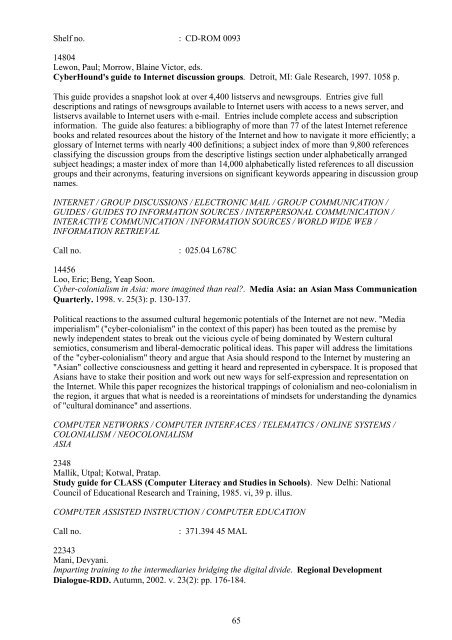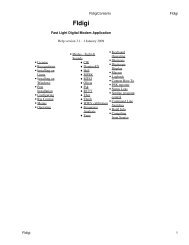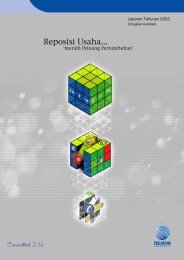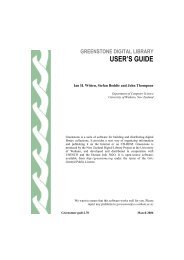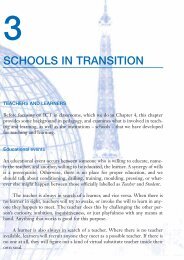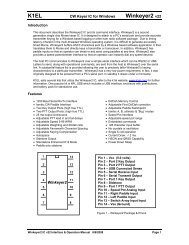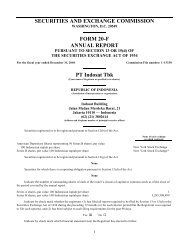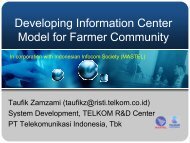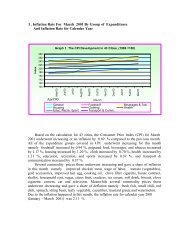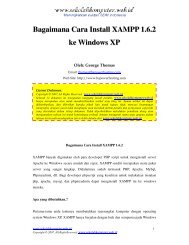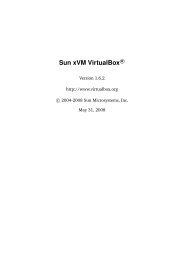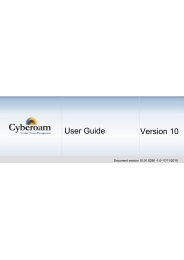CDS/ISIS Printing.. - Kambing UI
CDS/ISIS Printing.. - Kambing UI
CDS/ISIS Printing.. - Kambing UI
Create successful ePaper yourself
Turn your PDF publications into a flip-book with our unique Google optimized e-Paper software.
Shelf no. : CD-ROM 0093<br />
14804<br />
Lewon, Paul; Morrow, Blaine Victor, eds.<br />
CyberHound's guide to Internet discussion groups. Detroit, MI: Gale Research, 1997. 1058 p.<br />
This guide provides a snapshot look at over 4,400 listservs and newsgroups. Entries give full<br />
descriptions and ratings of newsgroups available to Internet users with access to a news server, and<br />
listservs available to Internet users with e-mail. Entries include complete access and subscription<br />
information. The guide also features: a bibliography of more than 77 of the latest Internet reference<br />
books and related resources about the history of the Internet and how to navigate it more efficiently; a<br />
glossary of Internet terms with nearly 400 definitions; a subject index of more than 9,800 references<br />
classifying the discussion groups from the descriptive listings section under alphabetically arranged<br />
subject headings; a master index of more than 14,000 alphabetically listed references to all discussion<br />
groups and their acronyms, featuring inversions on significant keywords appearing in discussion group<br />
names.<br />
INTERNET / GROUP DISCUSSIONS / ELECTRONIC MAIL / GROUP COMMUNICATION /<br />
G<strong>UI</strong>DES / G<strong>UI</strong>DES TO INFORMATION SOURCES / INTERPERSONAL COMMUNICATION /<br />
INTERACTIVE COMMUNICATION / INFORMATION SOURCES / WORLD WIDE WEB /<br />
INFORMATION RETRIEVAL<br />
Call no. : 025.04 L678C<br />
14456<br />
Loo, Eric; Beng, Yeap Soon.<br />
Cyber-colonialism in Asia: more imagined than real?. Media Asia: an Asian Mass Communication<br />
Quarterly. 1998. v. 25(3): p. 130-137.<br />
Political reactions to the assumed cultural hegemonic potentials of the Internet are not new. "Media<br />
imperialism" ("cyber-colonialism" in the context of this paper) has been touted as the premise by<br />
newly independent states to break out the vicious cycle of being dominated by Western cultural<br />
semiotics, consumerism and liberal-democratic political ideas. This paper will address the limitations<br />
of the "cyber-colonialism" theory and argue that Asia should respond to the Internet by mustering an<br />
"Asian" collective consciousness and getting it heard and represented in cyberspace. It is proposed that<br />
Asians have to stake their position and work out new ways for self-expression and representation on<br />
the Internet. While this paper recognizes the historical trappings of colonialism and neo-colonialism in<br />
the region, it argues that what is needed is a reoreintations of mindsets for understanding the dynamics<br />
of "cultural dominance" and assertions.<br />
COMPUTER NETWORKS / COMPUTER INTERFACES / TELEMATICS / ONLINE SYSTEMS /<br />
COLONIALISM / NEOCOLONIALISM<br />
ASIA<br />
2348<br />
Mallik, Utpal; Kotwal, Pratap.<br />
Study guide for CLASS (Computer Literacy and Studies in Schools). New Delhi: National<br />
Council of Educational Research and Training, 1985. vi, 39 p. illus.<br />
COMPUTER ASSISTED INSTRUCTION / COMPUTER EDUCATION<br />
Call no. : 371.394 45 MAL<br />
22343<br />
Mani, Devyani.<br />
Imparting training to the intermediaries bridging the digital divide. Regional Development<br />
Dialogue-RDD. Autumn, 2002. v. 23(2): pp. 176-184.<br />
65


